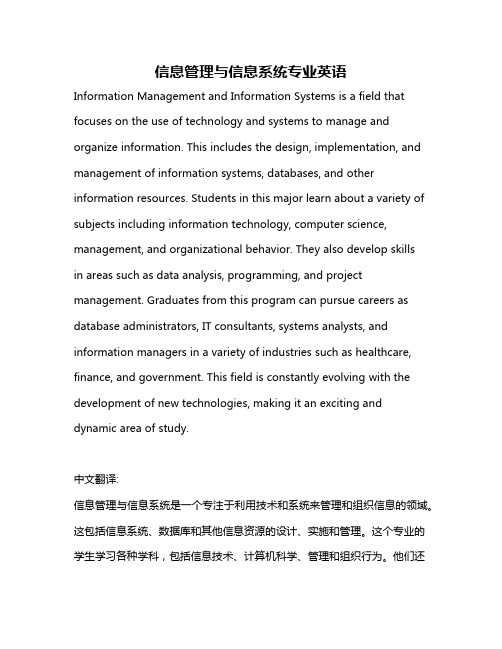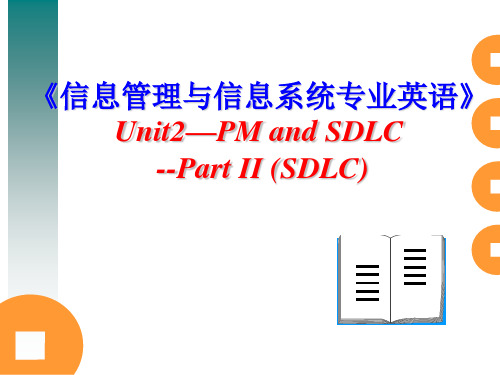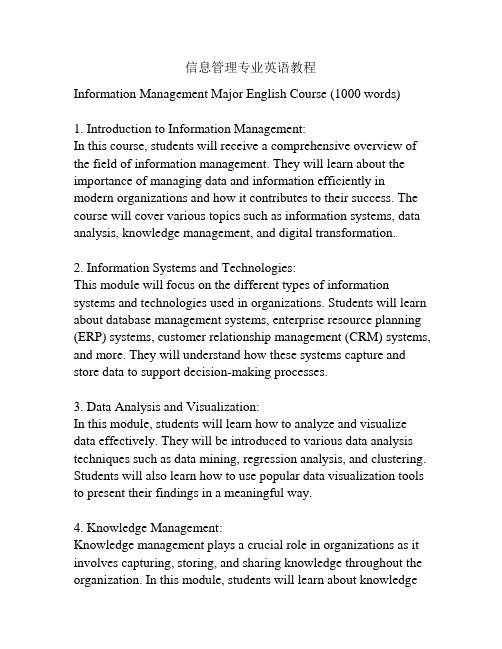信管专业英语基础知识(2)概况
信息管理与信息系统专业英语

信息管理与信息系统专业英语Information Management and Information Systems is a field that focuses on the use of technology and systems to manage and organize information. This includes the design, implementation, and management of information systems, databases, and other information resources. Students in this major learn about a variety of subjects including information technology, computer science, management, and organizational behavior. They also develop skillsin areas such as data analysis, programming, and project management. Graduates from this program can pursue careers as database administrators, IT consultants, systems analysts, and information managers in a variety of industries such as healthcare, finance, and government. This field is constantly evolving with the development of new technologies, making it an exciting and dynamic area of study.中文翻译:信息管理与信息系统是一个专注于利用技术和系统来管理和组织信息的领域。
专业英语(信管)教学大纲

专业英语(信管)教学大纲《专业英语》课程教学大纲课程代码:040642703课程英文名称:Professional English课程总学时:32 讲课:32 实验:0 上机:0适用专业:信息管理与信息系统大纲编写(修订)时间:2017.06一、大纲使用说明(一)课程的地位及教学目标本课程是一门职业基础课,其主要任务是通过本课程的学习,使学生应掌握信息管理与信息系统的专业英语词汇,能读懂英文的专业资料并能达到一般专业知识的英汉互译水平,将学生培养成为复合型人才,为他们今后走上工作岗位从事实际工作打下必要基础。
通过本课程的学习,学生将达到以下要求:1、掌握基本的信息管理与信息系统专业领域英语词汇;2、能阅读英文的专业资料;3、有一定的英汉互译水平。
(二)知识、能力及技能方面的基本要求1.基本知识:掌握初级的商务英语表达能力,了解信息管理与信息系统专业的常见名词,能够对其进行英汉互译。
词汇量要求为200个。
2.基本理论和方法:复习巩固基础英语中所学的语法知识。
能用所学词汇和语法知识正确理解与课文难度相仿的文章,能初步掌握英译汉的基本方法和技巧,能借助词典将与专业有关的英文资料译成汉语,基本通顺。
能听懂句子结构简单、语言材料熟悉的句子,能用英语进行简单的日常会话并能回答教师提出的简单问题,能组成意思完整的简单句子。
3.基本技能:掌握信息管理与信息系统专业的常见的听书读写的能力。
(三)实施说明1.教学方法:课堂讲授中要重点对基本语法和生僻词句进行讲解;采用启发式教学,培养学生思考问题、分析问题和解决问题的能力;引导和鼓励学生通过实践和自学获取知识,培养学生的自学能力;开展讨论课,调动学生学习的主观能动性;注意培养学生提高利用标准、规范及手册等技术资料的能力。
讲课要联系实际并注重培养学生的创新能力。
2.教学手段:本课程属于技术基础课,在教学中采用电子教案、CAI课件及多媒体教学系统等先进教学手段,以确保在有限的学时内,全面、高质量地完成课程教学任务。
(15)信管专业英语基础知识(2)

18
It is extraordinary that in all the years the British spent in Egypt they never got to know the real people of Egypt. (部分倒译) 英国人在埃及消磨的岁月如此之长,而对真正的埃及人民却 一无所知,这点颇不寻常。
方法论中究竟是指一般历史研究特有的概念,还 是指历史研究中各个具体领域适用的研究手段, 人们对此意见不一。
信息管理专业英语
20
词义的选择与引伸
(1) 词义的选择 在翻译过程中,若英汉双方都是相互对应的单义词时则汉 译不成问题,如broadband(宽带)。然而,由于英语词 汇来源复杂,一词多义和一词多性的现象十分普遍,比如 power 在数学中译为“乘方”,在光学中译为“率”,在 力学中译为“能力”,在电学中译为“电力”。 例:The electronic microscope possesses very high resolving power compared with the optical microscope. 译文:与光学显微镜相比,电子显微镜具有极高的分辨率。 例:Energy is the power to do work. 译文:能量是指做功的能力。
信息管理专业英语
15
专业英语中新词的翻译
科技的发展还创造了大量的新词汇。这些 词往往通过复合构词(compounding)或 缩略表达全新的概念。它们由于在词典中 缺乏现成的词项,一个词往往会有两个甚 至两个以上的译名,造成很大混乱。全国 科学技术名词审定委员会为了规范译名, 定期发表推荐译名,因此我们还必须跟踪 于信管相关行业的发展,掌握新出现的词 汇。
Unit 4《信息管理与信息系统专业英语》SDLC.ppt

memos (便签,备忘录), business plans, policy statements(政策声明), and so on.
安徽财贸职业学院 计算机系
《 SQL Server 数据库管理与开发》
Questionnaires may also yield (产生。。效果)
more information if respondents can be
anonymous(匿名的).
安徽财贸职业学院 计算机系
《 SQL Server 数据库管理与开发》
Part II—SDLC
--Do a detailed analysis of the system
Part II—SDLC
--Do a detailed analysis of the system
How to Gather data?
体系
One document of particular value is the organization chart (See Fig.2.1). An organization chart shows levels(??) of management and formal lines(??) of authority.
安徽财贸职业学院 计算机系
《 SQL Server 数据库管理与开发》
Part II—SDLC
--Do a detailed analysis of the system
How to Gather data? 3. Questionnaires --questionnaires are useful for getting information for a large groups of people when you can‘t get around to interviewing everyone.
信息管理专业英语教程

信息管理专业英语教程Information Management Major English Course (1000 words)1. Introduction to Information Management:In this course, students will receive a comprehensive overview of the field of information management. They will learn about the importance of managing data and information efficiently in modern organizations and how it contributes to their success. The course will cover various topics such as information systems, data analysis, knowledge management, and digital transformation.2. Information Systems and Technologies:This module will focus on the different types of information systems and technologies used in organizations. Students will learn about database management systems, enterprise resource planning (ERP) systems, customer relationship management (CRM) systems, and more. They will understand how these systems capture and store data to support decision-making processes.3. Data Analysis and Visualization:In this module, students will learn how to analyze and visualize data effectively. They will be introduced to various data analysis techniques such as data mining, regression analysis, and clustering. Students will also learn how to use popular data visualization tools to present their findings in a meaningful way.4. Knowledge Management:Knowledge management plays a crucial role in organizations as it involves capturing, storing, and sharing knowledge throughout the organization. In this module, students will learn about knowledgemanagement systems and strategies. They will understand how to develop a knowledge sharing culture and use technologies to facilitate knowledge sharing.5. Digital Transformation:In the digital age, organizations need to adapt to technological advancements to stay competitive. This module will focus on digital transformation and its impact on organizations. Students will learn about emerging technologies such as artificial intelligence (AI), blockchain, and the Internet of Things (IoT). They will explore how these technologies can be leveraged to enhance business processes and decision-making.6. Managing Information Security:Information security is a critical aspect of managing data and information. In this module, students will learn about the different types of security threats and vulnerabilities that organizations face. They will understand the importance of implementing security measures and best practices to protect sensitive information. Students will also learn about legal and ethical considerations in information management.7. Project Management:Effective project management is essential for successful implementation of information management initiatives. In this module, students will learn about project management methodologies and tools. They will understand how to plan, execute, and monitor information management projects within the given scope, time, and budget constraints.8. Future Trends in Information Management:This final module will explore the future trends and challenges in information management. Students will discuss topics such as big data, cloud computing, cybersecurity, and the role of artificial intelligence in information management. They will reflect on the skills and knowledge they have acquired throughout the course and consider how they can apply them in their future careers.In conclusion, this Information Management Major English Course provides students with a comprehensive understanding of the field. By covering topics such as information systems, data analysis, knowledge management, digital transformation, information security, project management, and future trends, students will develop the necessary skills and knowledge to thrive in this rapidly evolving industry.。
信息管理与信息系统专业 英语

信息管理与信息系统专业英语英文回答:Information Management and Information Systems.Information management is the collection, storage, organization, and dissemination of information. It is a critical function for any organization, as it allows for the effective use of information to make decisions and achieve goals. Information systems are the tools and technologies used to manage information. They can range from simple spreadsheets to complex enterprise resource planning (ERP) systems.The field of information management and information systems is constantly evolving, as new technologies emerge and new ways of working are developed. This has led to a growing demand for professionals with the skills and knowledge to manage information effectively.Skills and Knowledge Required for Information Management and Information Systems Professionals.Professionals in the field of information management and information systems typically need to have the following skills and knowledge:A strong understanding of information management concepts and principles.Proficiency in a variety of information systems software applications.Excellent communication and interpersonal skills.The ability to work independently and as part of a team.A strong work ethic and a commitment to excellence.Career Opportunities for Information Management and Information Systems Professionals.There are a wide range of career opportunitiesavailable for professionals with skills and knowledge in information management and information systems. Some of the most common job titles include:Information manager.Information systems manager.Database administrator.Systems analyst.Business analyst.Project manager.Professionals in these roles can work in a variety of industries, including healthcare, finance, manufacturing, and government.Education and Training for Information Management and Information Systems Professionals.There are a variety of educational and training programs available for professionals who want to work inthe field of information management and information systems. Some of the most common programs include:Bachelor's degree in information management or information systems.Master's degree in information management orinformation systems.MBA with a concentration in information management or information systems.Certificate programs in information management or information systems.Professional Development for Information Management and Information Systems Professionals.In order to stay up-to-date on the latest trends and technologies in the field of information management and information systems, professionals should pursue ongoing professional development. This can be done through a variety of activities, such as:Attending conferences and workshops.Reading industry publications.Taking online courses.Participating in online forums and discussion groups.中文回答:信息管理与信息系统专业。
信息管理与信息系统专业英语:专业词汇的中英文翻译和具体英文介绍
1. informationInformation, in its most restricted technical sense, is a sequence of symbols that can be interpreted as a message. Information can be recorded as signs, or transmitted as signals. Information is any kind of event that affects the state of a dynamic system. Conceptually, information is the message (utterance or expression) being conveyed. This concept has numerous other meanings in different contexts.[1] Moreover, the concept of information is closely related to notions of constraint, communication, control, data, form, instruction, knowledge, meaning, mental stimulus, pattern, perception, representation, and especially entropy.(信息,在其最受限制的技术意义上,是一个序列的符号,可以被解释为一个消息。
信息可以被记录为标志,或传输信号。
信息是任何类型的事件,影响一个动态系统的状态。
从概念上讲,信息是信息(话语或表达式)的表达。
这一概念具有许多其他在不同语境下的含义。
[1]此外,信息的概念密切相关的概念约束、通信、控制、数据、形式、指令、知识、意义,精神刺激,模式,感知的代表性,尤其是熵。
(完整版)信息管理与信息系统专业英语词汇总结
Lesson1distributed applications 分布式应用程序competitive advantage 竞争优势data warehouses 数据仓库incompatible databases 不兼容数据库decision support systems 决策支持系统executive information systems 执行信息系统DBMS——database management systems 数据库管理系统entry 款目metadata 元数据mainframe computer大型计算机desktop computer台式计算机laptop computer膝上型计算机spreadsheet 电子表格LAN ------local area network 局域网database server 数据库服务器user views 用户视图data security 数据安全性data integrity 数据完整性concurrent user 并发用户data updating 数据更新data redundancy 数据冗余consistency of data and metadata 数据和元数据的一致性distributed database 分布式数据库telecommunications network 远程通讯网Lesson2automatic indexing自动标引human indexing 人工标引extraction indexing 抽词标引assignment indexing赋词标引controlled vocabulary 受控词表non-substantive words 非实意词index terms 标引词automatic stemming 自动抽取词干weight 权值clue words 提示词inverted file 倒排文档absolute frequency 绝对词频relative frequency 相对词频information retrieval 信息检索syntactic criteria 句法规则word string 词串NLDB——Natural Language DataBase 自然语言数据库MAI——machine-aided indexing 机器辅助标引recall ratio 查全率precision ratio 查准率descriptor 叙词thesaurus 叙词表semantic vocabulary 语义词表concept headings 概念标题consistency of indexing 标引的一致性underassignment 欠量赋词overassignment 过量赋词back file 备份文件main heading 主标题subheading 副标题access point 检索点Lesson3machine-readable form 机读形式source document 源文献subject indexing 主题标引back-of-the-book indexing书后标引indexing scheme 标引方案NFAIS——National Federation of Abstracting and Information Services(美国)国家文摘与信息服务联合会scope notes 范围注释permuted list 轮排词表CAS——Chemical Abstracts Service 化学文摘社character set 字符集statistical correlation 统计关联ISI——Institute for Scientific Information (美国)科学情报社co-citation indexing 共引文标引SCI——Science Citation Indexes 科学引文索引SSCI——Social Science Citation Indexes 社会科学引文标引bibliometric analysis 书目计量分析Lesson4performance enhancement 性能改善scarce resources 稀缺资源proxy servers 代理服务器JAVA executables JAV可执行程序source code 源代码streaming media 流媒体outsourcing 业务外包wild card characters 通配符real-time traffic analysis 实时流量分析static web pages 静态网页ISDN——Integrated Services Digital Network 综合服务数据网URL——Uniform Resource Locator 统一资源定位符HTML——Hypertext Markup Language 超文本标识语言CGI——Common Gateway Interface 公共网关接口XML——Extension Markup Language 扩展标识语言OR——Operation Record 操作记录IIS——Internet Information Services 网络信息服务Lesson5IR——information retrieval 信息检索search engine spam 搜索引擎垃圾soft computing 软计算data mining 数据挖掘information fusion 信息融合classification 分类clustering 聚类thesaurus construction 词表构建Web page categorization 网页分类JPG——Joint Photographic Experts Group 图像文件格式GIF——Graphics Interchange Format 可交换的图像文件格式PNG——Portable Network Graphic 可移植的网络图像文件格式the WWW Consortium 万维网联盟HTTP——Hypertext Transfer Protocol 超文本传输协议TCP——Transfer Control Protocol 传输控制协议ASCII——American Standard Code for Information Interchange 美国信息互换标准代码CPUCentral Processing Unit 中央处理器Lesson6black-box services 黑箱服务delivering information 传递信息videoconferencing 视频会议cross reference互见,相互参照timeliness 及时性cross check 交叉检查,核对knowledge framework 知识结构Lesson7IP——intellectual property 知识产权electronic holdings of libraries 电子馆藏information infrastructure 信息基础设施copyright 版权patent 专利exclusive right 专有权subsequent editions 后续版本Lesson8encryption technologies 加密技术decrypted digital version 解密数字版本fair use doctrine 公平利用原则authenticity and integrity of the information 信息的可靠性和完整性DMCA——the Digital Millennium Copyright Act 数字千年版权法DVD——digital video diskencyclopedias 百科全书Lesson9CKO——chief knowledge officer 知识主管knowledge sharing 知识共享manual 手册competitive intelligence 竞争情报search engine 搜索引擎artificial intelligence 人工智能drill-down access 深度查询accessibility 可获得性knowledge discovery 知识发现quantitative data 定量数据qualitative data 定性数据virtual warehouses 虚拟(数据)仓库virtual library 虚拟图书馆relational database 关系数据库research and development 研发(研究与开发)directory 指南newsletter 简讯intelligent search agents 智能检索代理information resources 信息资源performance evaluation 性能评价Lesson10CIO——chief information officer信息主管ERP——Enterprise Resource Planning 企业资源规划CRM——Customer Relationship Management 客户关系管理Collaborative Applications Environment 协同应用环境workflow package 工作流软件包Lesson11rights of information users 信息用户的权利obligations of information users 信息用户的义务terms and conditions 条款。
信息管理与信息系统专业英语词汇总结[精选]
信息管理与信息系统专业英语词汇总结[精选]第一篇:信息管理与信息系统专业英语词汇总结[精选]Lesson1 distributed applications 分布式应用程序 competitive advantage 竞争优势 data warehouses 数据仓库incompatible databases 不兼容数据库decision support systems 决策支持系统executive information systems 执行信息系统DBMS——database management systems 数据库管理系统entry 款目metadata 元数据mainframe computer大型计算机 desktop computer台式计算机 laptop computer膝上型计算机 spreadsheet 电子表格LAN------local area network 局域网 database server 数据库服务器 user views 用户视图 data security 数据安全性 data integrity 数据完整性 concurrent user 并发用户 data updating 数据更新 data redundancy 数据冗余consistency of data and metadata 数据和元数据的一致性distributed database 分布式数据库telecommunications network 远程通讯网Lesson2 automatic indexing自动标引 human indexing 人工标引extraction indexing 抽词标引assignment indexing赋词标引controlled vocabulary 受控词表 non-substantive words 非实意词index terms 标引词automatic stemming 自动抽取词干 weight 权值clue words 提示词 inverted file 倒排文档absolute frequency 绝对词频relative frequency 相对词频information retrieval 信息检索syntactic criteria 句法规则word string 词串NLDB——Natural Language DataBase 自然语言数据库 MAI——machine-aided indexing 机器辅助标引recall ratio 查全率precision ratio 查准率 descriptor 叙词 thesaurus 叙词表semantic vocabulary 语义词表 concept headings 概念标题consistency of indexing 标引的一致性 underassignment 欠量赋词 overassignment 过量赋词 back file 备份文件 main heading 主标题 subheading 副标题 access point 检索点Lesson3 machine-readable form 机读形式 source document 源文献subject indexing 主题标引back-of-the-book indexing书后标引 indexing scheme 标引方案NFAIS——National Federation of Abstracting and Information Services(美国)国家文摘与信息服务联合会scope notes 范围注释 permuted list 轮排词表CAS——Chemical Abstracts Service 化学文摘社 character set 字符集statistical correlation 统计关联ISI——Institute for Scientific Information(美国)科学情报社co-citation indexing 共引文标引SCI——Science Citation Indexes 科学引文索引SSCI——Social Science Citation Indexes 社会科学引文标引bibliometric analysis 书目计量分析Lesson4 performance enhancement 性能改善scarce resources 稀缺资源 proxy servers 代理服务器JAVA executables JAV可执行程序source code 源代码streaming media 流媒体 outsourcing 业务外包wild card characters 通配符real-time traffic analysis 实时流量分析 static web pages 静态网页ISDN——Integrated Services Digital Network 综合服务数据网URL——Uniform Resource Locator 统一资源定位符HTML——Hypertext Markup Language 超文本标识语言CGI——Common Gateway Interface 公共网关接口XML——Extension Markup Language 扩展标识语言 OR——Operation Record 操作记录IIS——Internet Information Services 网络信息服务Lesson5 IR——information retrieval 信息检索 search engine spam 搜索引擎垃圾 soft computing 软计算 data mining 数据挖掘information fusion 信息融合 classification 分类 clustering 聚类thesaurus construction 词表构建 Web page categorization 网页分类JPG——Joint Photographic Experts Group 图像文件格式GIF——Graphics Interchange Format 可交换的图像文件格式PNG——Portable Network Graphic 可移植的网络图像文件格式 the petitive intelligence 竞争情报 search engine 搜索引擎artificial intelligence 人工智能drill-down access 深度查询accessibility 可获得性knowledge discovery 知识发现quantitative data 定量数据qualitative data 定性数据virtual warehouses 虚拟(数据)仓库 virtual library 虚拟图书馆relational database 关系数据库research and development 研发(研究与开发)directory 指南newsletter 简讯intelligent search agents 智能检索代理 information resources 信息资源 performance evaluation 性能评价Lesson10CIO——chief information officer信息主管ERP——Enterprise Resource Planning 企业资源规划CRM——Customer Relationship Management 客户关系管理Collaborative Applications Environment 协同应用环境workflow package 工作流软件包Lesson11rights of information users 信息用户的权利obligations of information users 信息用户的义务terms and conditions 条款第二篇:信息管理与信息系统专业英语复习资料信管专业英语复习资料【P1】An information society is a society in which the creation, distribution, diffusion, use, and manipulation of information is a significant economic, political, and cultural activity.(译)信息社会是一个以信息创建、发布、传播、使用和管理为重要经济、政治和文化活动的社会。
信管专业英语
Unit 1 Management Information SystemTextIntroduction to Management Information SystemWhat Is MIS?The first step in learning how to apply information technology to solve problems is to get a broader picture of what is meant by the term management information system. You probably have some experience with using computers and various software packages. Yet, computers are only one component of a management information system. A management information system (MIS), or computer information system (CIS), consists of five related components: hardware, software, people, procedures, and collections of data. The term information technology (IT) represents the various types of hardware and software used in an information system, including computers and networking equipment. The goal of MIS is to enable managers to make heifer decisions by providing quality information.The physical equipment used in computing is called hardware. The set of instructions that controls the hardware is known as software. In the early days of computers, the people directly involved in MIS tended to be programmers, design analysts, and a few external users. Today, almost everyone in the firm is involved with the information system. Procedures are instructions that help people use the systems. They include items such as user manuals, documentation, and procedures to ensure that backups are made regularly. Data-bases are collections of related data that can be retrieved easily and processed by the computers. As you will see in the cases throughout the book, all of these components are vital to creating an effective information system.So what is information? One way to answer that question is to examine the use of information technology on three levels: (1) data management, (2) information systems, and (3) knowledge bases. Data consists of factual elements (or opinions or comments) that describe some object or event. Data can be thought of as raw numbers or text. Data management systems focus on data collection and providing basic reports. Information represents data that has been processed, organized, and integrated to provide more insight. Information systems are designed to help managers analyze data and make decisions. From a decision maker’s standpoint, the challenge is that you might not know ahead of time which information you need, so it is hard to determine what data you need to collect. Knowledge represents a higher level of understanding, including rules, patterns, and decisions. Knowledge-based systems are built to automatically analyze data, identify patterns, and recommend decisions. Humans are also capable of wisdom, where they put knowledge, experience, and analytical skills to work to create new knowledge and adapt to changing situations. T o date no computer system has attained the properties of wisdom.To create an effective information system, you need to do more than simply purchase the various components. Quality is an important issue in business today, particularly as itrelates to information systems. The quality of an information system is measured by its ability to provide exactly the information needed by managers in a timely manner. The information must be accurate and up-to-date. Users should be able to receive the information in a variety of formats: tables of data, graphs, summary statistics, or even pictures or sound. Users have different perspectives and different requirements, and a good information system must have the flexibility to present information in diverse forms for each user.Why Is Information Technology Important?Personal ProductivityAn enormous amount of data is available to managers—generated internally and externally. It is impossible to deal with this volume of data without information technology. The era of “pure” managers who simply direct other people is gone. Managers today must be capable of performing the tasks within their area of expertise. For example, accounting managers still practice accounting, lawyers handle cases, and financial managers still track investments. In other words, managers do two jobs: perform basic day-to-day functions, as well as plan, organize, and communicate.Firms are increasingly required to improve productivity, which means that each year managers must increase production without increasing the number of workers. Information technology is critical to this improvement process, enabling employees to perform more tasks, getting work done faster at lower cost.Teamwork and CommunicationIt is tempting to believe that once you learn how to use a word processor, a spreadsheet program, and a Web browser, you have all the computer knowledge needed to solve business problems. In fact, these are powerful tools that will help you solve business problems that arise at a personal level. But businesses have many more levels of problems, such as data collection, departmental teamwork, information shared throughout the corporation, and uses of if that help the business gain a competitive advantage.You also need to understand database, groupware, and enterprise tools that give you access to data across the company and help you share it with team members around the world. Most companies are in a continual race to get products and services to customers faster than the competition. Moving communication away from paper to electronic messages and online meetings can significantly reduce the time required to coordinate a group and make decisions—speeding up the overall process.Business Operations and StrategyInformation technology is increasingly critical to the daily operations of a business. Obviously, online businesses cannot live without technology, but neither can the local grocery stores, bank, or many other businesses. Computers process sales, handle payments, and place new orders. They also analyze the sales data and help set prices and predict trends. Information technology is also used to create new products and services or to provide unique features to existing products. These new features can give your company. a strategic advantage and help the company grow.What do managers do?Traditional Management and ObservationsTo create useful information systems, it is helpful to examine the various roles of management. Traditional concepts of management focus on organizing, planning, and control. However, when observed at their jobs, managers appear to spend most of their time in meetings, talking on the phone, reading or preparing reports, discussing projects with their colleagues, explaining procedures, and participating in other activities that are difficult to fit into the traditional framework.Henry Mintzberg, a psychologist who studies management, classifies managerial tasks into three categories: (1) interpersonal, (2) informational, and (3) decisional. Interpersonal roles refer to teaching and leading employees. Informational tasks are based on the transfer of information throughout the organization, such as relaying information to subordinates or summarizing information for executives. Decisions involve evaluating alternatives and choosing directions that benefit the firm.Other researchers have studied managers and developed alternative classifications. Fred Luthans uses three classifications of management activities. He indicates that approximately 50 percent of a manager’s time is spent on traditional management activities (planning, organizing, etc.), 30 percent in formal communications, and 20 percent in informal networking. Formal communications include attending meetings and creating reports and memos. Informal networking consists of contacts with colleagues and workers that tend to be social in nature but often involve discussions regarding business and jobs.Making DecisionsIn many ways managers expend a lot of their effort in making decisions or contributing in- formation so others can make decisions. When you look at courses offered for future man agers you will find a focus on administration, human behavior, quantitative modeling and problem solving, decision theory, and elements of business ethics and globalization. Typically, these courses are designed to help managers solve problems and make decisions. However, if you ask managers how much time they spend making decisions, they are likely to say that they seldom make decisions. That seems like a contradiction. If managers and executives do not make decisions, who does?In many organizations, day-to-day decisions are embodied in the methodology, rules, or philosophy of the company. Managers are encouraged to collect data and follow the decisions that have resulted from experience. In this situation and in many others, the managers are directly involved in the decision process, even though they may not think they are making the final choice.The broader decision process involves collecting data, identifying problems, and making choices. One more step is often involved: persuading others to accept a decision and implement a solution. With this broader definition, many of the tasks performed by managers are actually steps in the decision process. Meetings, phone calls, and discussions with colleagues are used to collect data, identify problems, and persuade others to choose a course of action. Each of these steps may be so gradual that the participants do not think they are actually making decisions.Because of the subtlety of the process and the complexity of the decisions, it is often difficult to determine what information will be needed. Decisions often require creativity.Because data generally need to be collected before problems arise, it is challenging to design information systems to support managers and benefit the organization. One important job of management is to examine the need for information and how it can be used to solve future problems.。
- 1、下载文档前请自行甄别文档内容的完整性,平台不提供额外的编辑、内容补充、找答案等附加服务。
- 2、"仅部分预览"的文档,不可在线预览部分如存在完整性等问题,可反馈申请退款(可完整预览的文档不适用该条件!)。
- 3、如文档侵犯您的权益,请联系客服反馈,我们会尽快为您处理(人工客服工作时间:9:00-18:30)。
信息管理专业英语
4
阅读方法
略读(Skimming),查读(Scanning), 精读(Reading for full understanding)。 略读是指以尽可能快的速度进行阅读。 查读的目的主要是要有目的地去找出文章 中某些特定的信息。
精读是指仔细地阅读,力求对文章有深层 次的理解,以获得具体的信息。
信息管理专业英语
9
翻译的过程
1、理解阶段 透彻理解原著是确切表达的前提。理解原文 必须从整体出发,不能孤立地看待一词一句。 每种语言几乎都存在着一词多义的现象。因此, 同样一个词或词组,在不同的上下文搭配中, 在不同的句法结构中就可能有不同的意义。一 个词,一个词组脱离上下文是不能正确理解的。 因此,译者首先应该结合上下文,通过对词义 的选择,语法的分析,彻底弄清楚原文的内容 和逻辑关系。
信息管理专业英语 的基础知识(二)
信息管理专业英语
1
信管专业资料的阅读与翻译
专业英语的阅读 专业英语翻译概述 专业术语的翻译 专业英语翻译的基本方法
信息管理专业英语
2
专业英语的阅读
打好语言基本功 在阅读实践中提高阅读能力
掌握正确的阅读方法
信息管理专业英语
3
专业英语的阅读(例子)
Most of methods used in data mining have so far originated (产生于) in fields other than statistics(统计学). 到目前为止,使用在数据挖掘中的 大多数方法而不是来自于统计学专业。
信息管理专业英语
10
翻译的过程
2、表达阶段 表达就是要寻找和选择恰当的归宿语言 材料,把已经理解了的原作内容重新叙述 出来。表达的好坏一般取决于理解原著的 深度和对归宿语言的掌握程度。故理解正 确并不意味着表达一定正确。
信息管理专业英语
11
翻译的过程
3、校对阶段 校对阶段,是理解和表达的进一步深化, 是使译文符合标准的一个必不可少阶段, 是对原文内容的进一步核实,对译文语言 的进一步推敲。校对对于科技文献的译文 来说尤为重要,因为科技文章要求高度精 确,公式、数据较多,稍一疏忽就会给工 作造成严重的损失。
信息管理专业英语
13
专业术语的翻译
2. 音译 音译就是根据英语单词的发音译成读音与原词大致相同的汉字。 一般地,表示计量单位的词和一些新发明的材料或产品,它们的汉 语名称在刚开始时基本就是音译的。或当由于某些原因不便采用意 译法时,可采用音译法或部分音译法。 Radar是取radio detection and ranging等词的部分字母拼成的,如 译成“无线电探测距离设备”,显得十分罗嗦,故采用音译法,译 成“雷达”。 bit 比特(二进制信息单位) quark 夸克(基本粒子,属新材料类) nylon 尼龙(新材料类) hertz 赫兹(频率单位) penicillin 盘尼西林(青霉素)
信息管理专业英语
7
科技翻译需要掌握的知识
掌握一定的词汇量 具备科技知识,熟悉所翻译专业 了解中西方文化背景的异同,科技英语中 词汇的特殊含义 日常语言和文本的表达方式以及科技英语 翻译技巧。
信息管理专业英语
8
翻译步骤
(1) 通读整个句子,了解初步含义。重点注意谓语动词、连 词、介词、专用词组和实义动词以及暂时不了解的新词 汇。 (2) 决定是否分译,如何断句。原句标点和句型结构如何, 语态及时态如何,灵活组织,保持前后文之间的逻辑联 系和呼应关系。 (3) 决定汉语如何表达,如何组句,所选汉语词意是否确切。 译文是否要进行查、加、减、改或者引申译法。概念明 确、用词恰当、逻辑清楚、文字通顺。 (4) 翻译完成后要多读译文,是否通顺、能懂、上下文及逻 辑关系对不对等,即要译者自己懂,也要尽量使别人阅 读译文后也能懂,要为读者着想。
信息管理专业英语
12
专业术语的翻译
1. 意译 意译就是对原词所表达的具体事物和概念进行仔细推 敲,以准确译出该词的科学概念。这种译法最为普遍, 科技术语在可能情况下应尽量采用意译法。采用这种方 法便于读者顾名思义,不加说明就能直接理解新术语的 确切含义。 loudspeaker 扬声器 semiconductor 半导体 videophone 可视电话 cut-over 切换 modem 调制解调器
信息管理专业英语
5
基本阅读技能
掌握所读材料的主旨大意。 了解阐述主旨的事实和细节。 根据上下文判断某些词汇和短语的意义。 既理解个别句子的意义,也理解上下文之间的 逻辑关系。 根据所读材料进行一定的判断、推理和引申。 领会作者的观点、意图和态度。
信息管理专业英语
6
专业英语翻译概述
信息管理专业英语
14
专业术语的翻译
3. 形译 用英语常用字母的形象来为形状相似的物体定名,翻译 时也可以通过具体形象来表达原义,也称为“象译”。科 技文献常涉及到型号、牌号、商标名称及代表某种概念的 字母。这些一般不必译出,直接抄下即可。另外,对于人 名及公司名等名称类的词汇,翻译时可直接使用原文。 I-shaped 工字形 T square 丁字尺 C network C形网络 X ray X射线 M-wing M形机翼 N region N区 Y-connection Y形连接 Q band Q波段(指8毫米波段,频率为3646千兆赫)
信息管理专业英语
15
专业英语中新词的翻译
科技的发展还创造了大量的新词汇。这些 词往往通过复合构词(compounding)或 缩略表达全新的概念。它们由于在词典中 缺乏现成的词项,一个词往往会有两个甚 至两个以上的译名,造成很大混乱。全国 科学技术名词审定委员会为了规范译名, 定期发表推荐译名,因此我们还必须跟踪 于信管相关行业的发展,掌握新出现的词 汇。
